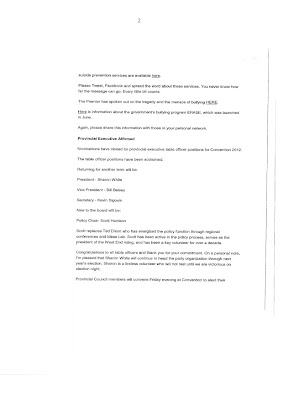China's
Mounting Challenge to Our National Sovereignty
 |
| Trade Minister Ed Fast and Chinese Commerce Minister Chen Deming sign "free trade" FIPA deal at the APEC Leaders’ Meeting in Vladivostok, Russia on September 8 as Canadian Prime Minister Stephen Harper and Chinese President Hu Jintao look on. Photo credit: PMO. |
Foreign-staffed mines in BC, Nexen on the block and
the FIPA giveaway... wake up Canada!
Tuesday October 23, 2012
By Bill Tieleman
"Let China sleep, for
when she awakes, she will shake the world."
- Napoleon Bonaparte,
1769-1821
How will Canada deal with
the China challenge to our national sovereignty?
It may be the most important
question facing the country, with far more dire consequences than the election
of a separatist provincial government in Quebec.
Is Canada
sleepwalking towards a future day when a communist-ruled undemocratic China has
significant control of key parts of our economy? The evidence is mounting.
This month we learned
the BC Liberal and federal Conservative governments are jointly allowing up to
2,000 miners from China to operate as many as four planned coal mines, despite
that country having the deadliest coal industry in the world.
The Canadian Dehua
International Mines Group, which is planning all four mines, claims it cannot
find any Canadian coal miners to fill the jobs, but the United Steelworkers
union discovered that ads advertising the positions listed speaking Mandarin as
a requirement. The jobs also pay as little as half the going Canadian pay rates
for miners.
A spokesperson for
one of the companies partnering in the mine, HD Mining
International, said
the ads were a mistake and have been withdrawn.
Then there's the
proposed $15-billion purchase of Calgary-based oil and gas giant Nexen Inc. by
Chinese state-owned China National
Offshore Oil Corporation -- a deal the federal government must
approve before it can proceed.
Nexen shareholders
have already approved the
acquisition and no wonder -- CNOOC is willing to pay a 66 per cent
premium on its average trading price.
But will the
Conservative government risk both Chinese government and Nexen shareholder
anger by rejecting the deal as not having a "net benefit" to Canada?
The odds seemed
strongly stacked against that.
Interest in
resources, telecom
Conservative
International Trade Minister Ed Fast was quick to say that the government
decision last week to reject the $5.2 billion takeover of Calgary-based
Progress Energy Resources by Petronas, the Malaysian state-owned company,
doesn't mean the CNOOC acquisition of Nexen will be rejected.
"This decision
does not set a precedent because every single application is considered on its
own merits," Fast said.
"Each application has its own specific circumstances that are being
brought to bear."
That's hardly
reassuring to anyone concerned about loss of Canadian ownership of key natural
resources.
Yet key U.S.
Democrats oppose the Nexen takeover by CNOOC, something that may affect
Harper's decision.
Howard Dean, the
influential former Vermont governor and Democratic presidential nomination
contender, is warning Canada could face a U.S. backlash if it authorizes a
CNOOC purchase of Nexen.
"I personally
don't think that's a good idea for either Canadian or American assets,"
Dean told
Tom Clark on Global News program The West Block.
There are also
questions about the role of Chinese telecom giant Huawei Technologies in
Canada.
Earlier this month
the Conservative government made an unusual comment about the possibility that
Huawei might bid on rebuilding Ottawa's telecommunications network.
The next day Andrew
MacDougall, Conservative Prime Minister Stephen Harper's communications
director, made this less than cryptic comment: "The government's going to
be choosing carefully in the construction of this network, and it has invoked
the national security exception for the building of this network.
"I'm not going
to comment on any one company in particular. I'll leave it to you if you think
Huawei should be a part of a Canadian government security system,"
MacDougall said.
The biggest threat
But perhaps the
biggest threat is Conservative Prime Minister Stephen Harper's plan to
implement the Canada-China Foreign Investment Promotion and Protection
Agreement (FIPA) by Nov. 1.
Gus Van Harten, an
Osgoode Hall law professor and global authority on international trade deals,
says he is "deeply concerned about the implications for Canada" and urges the
government to reconsider based on 14 different reasons.
"The legal
consequences of the treaty will be irreversible by any Canadian court,
legislature or other decision-maker for 31 years after the treaty is given
effect," Van Harten wrote in a letter to Harper, adding that it has a
15-year minimum term.
Other key arguments
against the China-Canada
treaty include that in order to sue under its provisions, a Chinese
company requires only a minority share in any Canadian enterprise or other
asset in Canada and that "Chinese asset-owners in Canada will be able, at
their option, to challenge Canadian legislative, executive, or judicial
decisions outside of the Canadian legal system and Canadian courts."
In another analysis,
The Tyee's Andrew Nikiforuk describes the agreement as "economic
treason."
Napoleon Bonaparte
eventually met his Waterloo -- is the Canada-China deal our fatal losing battle
on national sovereignty?
.










































